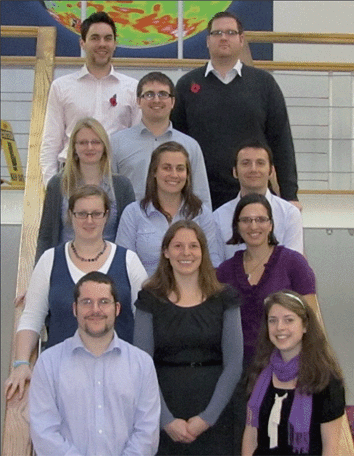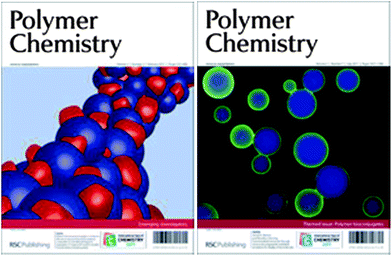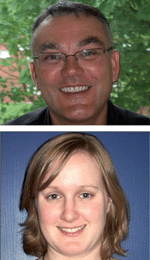Polymer Chemistry: the future's bright
So now we have published the first two volumes of Polymer Chemistry and already the journal has made its mark on the community. For such a young journal to already be so widely read and well-thought of is a tremendous credit to everyone involved in Polymer Chemistry. And we would like to take this opportunity to thank all of you who contribute.Firstly, our authors who send us their best work. We are delighted with the quality and number of submissions we have received. Polymer Chemistry is quickly establishing itself as a top quality journal which offers fast publication times and a good experience for authors. All manuscripts are handled by either Dave or one of our Associate Editors, Eva Harth (Vanderbilt University) or Yuliang Yang (Fudan University).
Our enthusiastic Editorial and Advisory Board members are a pleasure to work with and their passion for the journal is plain to see. The Fall ACS in Denver was a great time to catch up with our Board members and congratulations to Rachel O'Reilly, Brent Sumerlin, Chris Barner-Kowollik and Tom Davis for winning their very own Polymer Chemistry mugs for their contributions to the journal (Fig. 1)! Finally, thanks to the team in our Cambridge Editorial office (Fig. 2) who look after papers once they have been accepted, carrying out the editing, proofing and organising the publication of issues.
 | ||
| Fig. 1 Rachel, Brent and Tom delighted with their prizes. | ||
 | ||
| Fig. 2 The Polymer Chemistry team (left column, top to bottom: Peter Moorby, Tegan Thomas, Liz Davies, Jon Watson, middle column: Ross McLaren, Serin Dabb, Sylvia Pegg, right column: Paul Cooper, Russell Johnson, Kate Godhino, Jess Cocker). | ||
This is also a good opportunity to look over some of the highlights of the past 12 months and to tell you about some of the things coming up next year to look out for. In 2011, we published the first two themed issues in Polymer Chemistry (Fig. 3). Issue 2 was filled with papers from emerging investigators in the early stages of their careers. Guest edited by Rachel O'Reilly and Andrew Dove (both at Warwick University), this issue showcased some fantastic work by tomorrow's leaders of the field. Our second themed issue was on polymer bioconjugates, with guest editors Jan van Hest (Radboud University Nijmegen) and Brent Sumerlin (Southern Methodist University). We were delighted with the interest this themed issue received and hope you enjoyed reading the articles!
 | ||
| Fig. 3 Polymer Chemistry's first two themed issues. | ||
2011 also saw Polymer Chemistry join the world of social networking. As well as being a top quality journal, Polymer Chemistry has quickly become a part of the community and we take pleasure in being a forum for the dissemination of information and news of interest to all polymer chemists. Our blog regularly features posts on articles and conferences. Look out for our popular Author of the Week interviews by our web writers Remzi Becer (Warwick University) and Julien Nicolas (University Paris-Sud) posted every Friday and, coming soon in 2012, a new regular item of Paper of the Week! For those of you who have published in Polymer Chemistry, look out for a message from our web writers for your chance to be featured in one of these posts. You can also keep up-to-date by following us on Twitter @PolymChem or finding us on Facebook.
2012 will be an exciting year for Polymer Chemistry. We have more fantastic themed issues in the pipeline, such as one entitled New Methods of Polymer Synthesis with guest editors Christopher Barner-Kowollik (Karlsruhe Institute of Technology, Germany), Jean-François Lutz (Institut Charles Sadron, France) and Sébastien Perrier (University of Sydney, Australia). The journal will also receive its first impact factor with the release of the 2011 Journal Citation Report in June 2012. We will be celebrating this milestone at Warwick 2012 and hope to see many of you there. We will also be attending a number of other conferences throughout the year so look out for us and please do come and say hi. If you have any comments or ideas for Polymer Chemistry we would be delighted to hear from you at any time; simply email us at polymers-rsc@rsc.org.
With best wishes for the holiday season and a fantastic 2012!
Dave Haddleton (Editor-in-Chief) and Liz Davies (Managing Editor)
RSC Publishing growth and successes
Journals from RSC Publishing are delivering impressive results on Impact Factors, growth in quality content and international visibility and influence. The 2010 Journal Citation Reports ® proved that our quality is better than ever, and that is thanks to our authors and referees. Of the top 20 journals in the multidisciplinary chemistry category, 25% are from RSC Publishing. Plus 83% of our journals listed in this year's report have an IF above 3.The number of articles published in our journals has almost doubled in just two years–and our share of the total has also nearly doubled in that time. More titles have recently joined our portfolio: RSC Advances and Catalysis Science & Technology. And Chemical Science received the ALPSP Award for Best New Journal 2011.
So more and more authors—from 70+ countries in 2011—are trusting us to ensure their research is communicated to the global community. Our Editorial and Advisory Boards are international, and our publishing operation is supported by offices in USA, China, India and Japan. Plus our content is downloaded by growing numbers of readers in virtually every country in the world.
These facts demonstrate that RSC journals are increasingly valued as a key resource for the very best research.
Books delivering the latest research advances, information, opinions and perspectives in modern science, confirms our reputation as one of the fastest and most dynamic publishers in the world.
In an age where content is key, we understand the importance of your online chemical science resource. The RSC eBook Collection now holds more than 1,000 books, equating to over 25,000 chapters, and spanning more than 40 years. The publication of our 1000th eBook in 2011 was a celebratory milestone.
We continue to provide expert, interdisciplinary chemical science books: over 100 new print titles are planned for 2012 alongside the launch of several new series including:
• Food and Nutritional Components in Focus
• New Developments in Mass Spectrometry
• New Developments in NMR
• RSC Smart Materials
Our ability to deliver fast, accurate information to our customers was rewarded by the BIC Basic Award, an accolade held by few publishers.
RSC Publishing Platform
Access one million journal articles and book chapters in one simple integrated search.The RSC Publishing Platform provides the most valued interface and features that connect you with the highest quality scientific research. With one single search box, students, academics, researchers, scientists and professionals can easily access our books, journals and databases. www.rsc.org/platform
To access content on the go, download our RSC Mobile app for your electronic device.
Free Online Access
Free online access is available to all our newest journals, and much more—all you need to do is register for an RSC Publishing Personal Account. Once logged in, you will be able to access all our free content including:• All content of our newest journals for the first two volumes
• Any articles that are part of a special free access promotion (e.g. ‘hot’ papers, web theme issues, etc)
• A sample chapter from each book in the RSC eBook Collection
With your username and password you can access free content any time, any place–all you need is internet access. You can also save searches and favourite articles. Register now at www.rsc.org/personalregistration
If your institution/organisation is a current customer or on a free trial with IP registered addresses, you will be able to access all free content automatically, if authenticated. To request free access for your institution/organisation, go to www.rsc.org/freeaccess.
ChemSpider: the free chemical database
www.chemspider.com gives you the most comprehensive view of freely available chemical data from a single online search.Search: over 26 million structures from 400+ sources
Discover: related information from RSC publications, Wikipedia, Google Scholar & PubMed
Share: add and curate data
Access ChemSpider anytime, anyplace, anywhere with the free ChemSpider mobile app, www.rsc.org/ChemSpidermobile
ChemSpider SyntheticPages is a freely available interactive database of synthetic chemistry. It contains practical and reliable organic, organometallic and inorganic chemical syntheses, reactions and procedures deposited by synthetic chemists. Synthetic methods on the site are updated continuously by chemists working in academic and industrial research laboratories. ChemSpider SyntheticPages encourages submissions from graduate students, postdocs, industrialists and academics.
Discover ChemSpider SyntheticPages today: http://cssp.chemspider.com
RSC Conferences and Events 2012
The RSC organises a broad range of conferences and events to promote the advancement of the chemical sciences. Please visit the website for the most up to date listing: www.rsc.org/eventsThe major scientific meetings planned for 2012 include:
Challenges in Organic Chemistry and Chemical Biology (ISACS7)
12–15 June 2012, Edinburgh, UK
Challenges in Inorganic and Materials Chemistry (ISACS8)
19–22 July 2012, Toronto, Canada
Challenges in Nanoscience (ISACS9)
31 August–3 September 2012, Xiamen, China
21 st IUPAC International Conference on Physical Organic Chemistry (ICPOC 21)
9–13 September 2012, Durham, UK
| This journal is © The Royal Society of Chemistry 2012 |

